In conversation with Sega Bodega
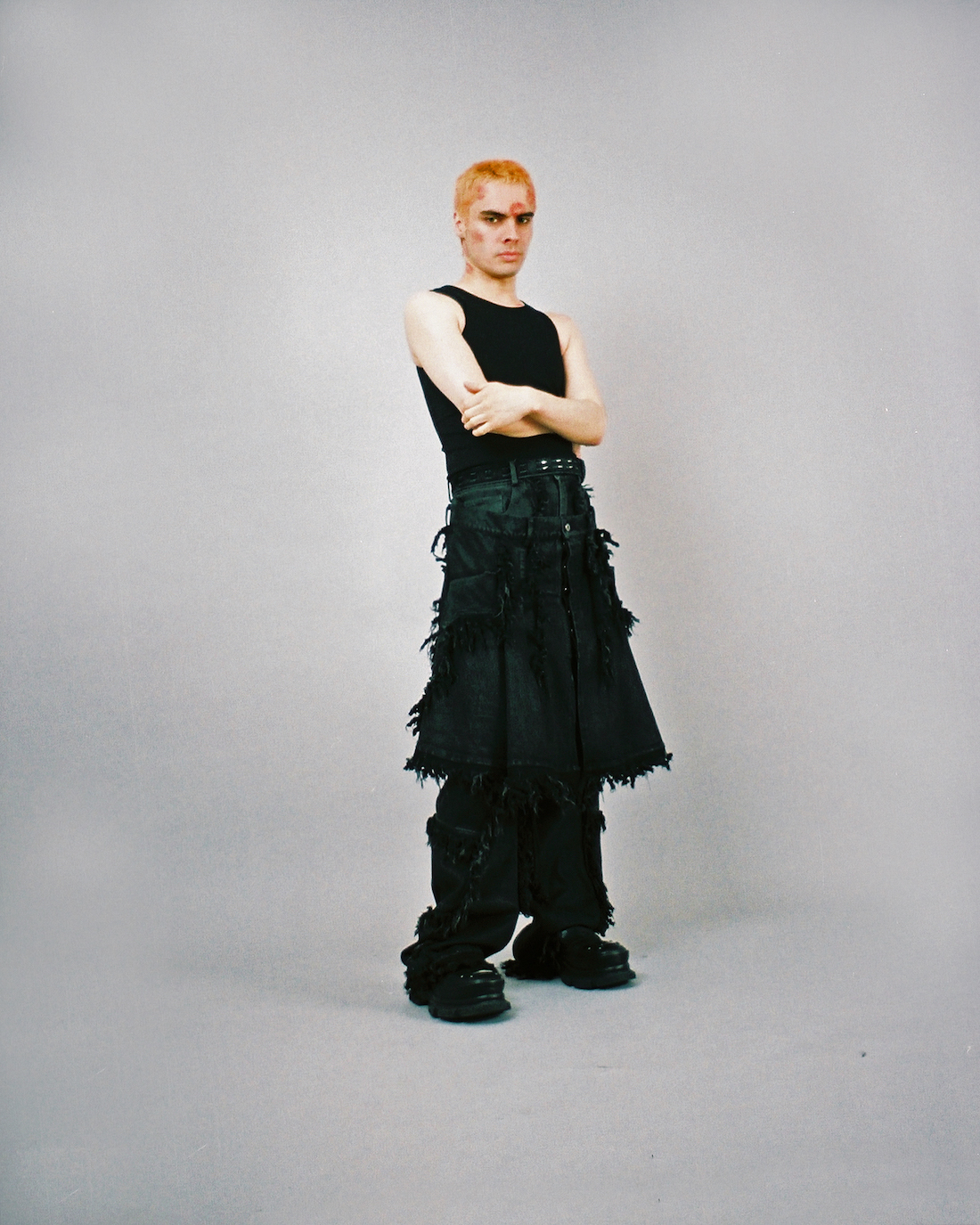
Full-look CANNNONE
Enter the elusive dreamscape of SEGA BODEGA, a liminal space of shifting shapes, whispered echoes and magnetic friction. A glitched-out interrogation of his own reality, suspended on the thinning line between dreams and oblivion, is the world Bodega dives into on his latest project, Dennis. With our pleasure and faint fear, Glamcult irresistibly get pulled into it with him.
Irish-Chilean musician Sega Bodega, born Salvador Navarrete, has cemented his mainstay presence that rules over left-field undercurrents of the electronic music scene over the last decade. Consistently stretching the limits of synthesised sounds, he has attracted an ever-expanding list of collaborators—from his production on Shygirl’s Nymph to Björk and Rosalía’s single Oral, Bodega’s signature style has coloured a new generation of pop. This explosive, genre-traversing vision has only been expanded further in his recent autonomous works, Salvador, Romeo and Dennis – which, as he explains, are all eponymous “after different parts of myself”.
Tracing back his artistic journey, it’s unsurprising to learn that Bodega’s musical ambitions have known no confinement. “I started writing music when I got my first guitar at around age nine,” he shares of his early beginnings. “Before that, I used to get cardboard boxes and cut the shape of a guitar to feel like I had one.” This dauntless DIY attitude followed him into teenagerhood when Bodega started teaching himself how to mix—and it remains central to his innovative ethos to this day. And as for the guitar, he still manages to masterfully interweave its instrumental chords into chromatic digital landscapes. Now, some 20 years later, Glamcult catches Bodega in the midst of the Paris Fashion Week chaos, which he gently acknowledges yet doesn’t let affect his inner focus. “I saw Arca do a show. That was fun,” he recalls of the highlights (or, well, one highlight—more related to seeing a dear friend play rather than the surrounding spectacle of the week) in the most unbothered manner. It becomes immediately clear that his headspace is occupied with the upcoming release.
“It’s hard to explain” is a phrase Bodega finds himself circling back to throughout our conversation, as we somewhat foolishly attempt to distil the intricate workings of his mind. The mutual understanding of how words will inevitably fail at capturing the multiplicity of his vision is palpable from the moment we ask our first question, and calls for a gentle disclaimer that Bodega’s work flourishes in full force through experience rather than intellectualisation. Still, this incapacity to be described verbally only points to the abundance of references and calculated intentionality, not their lack.
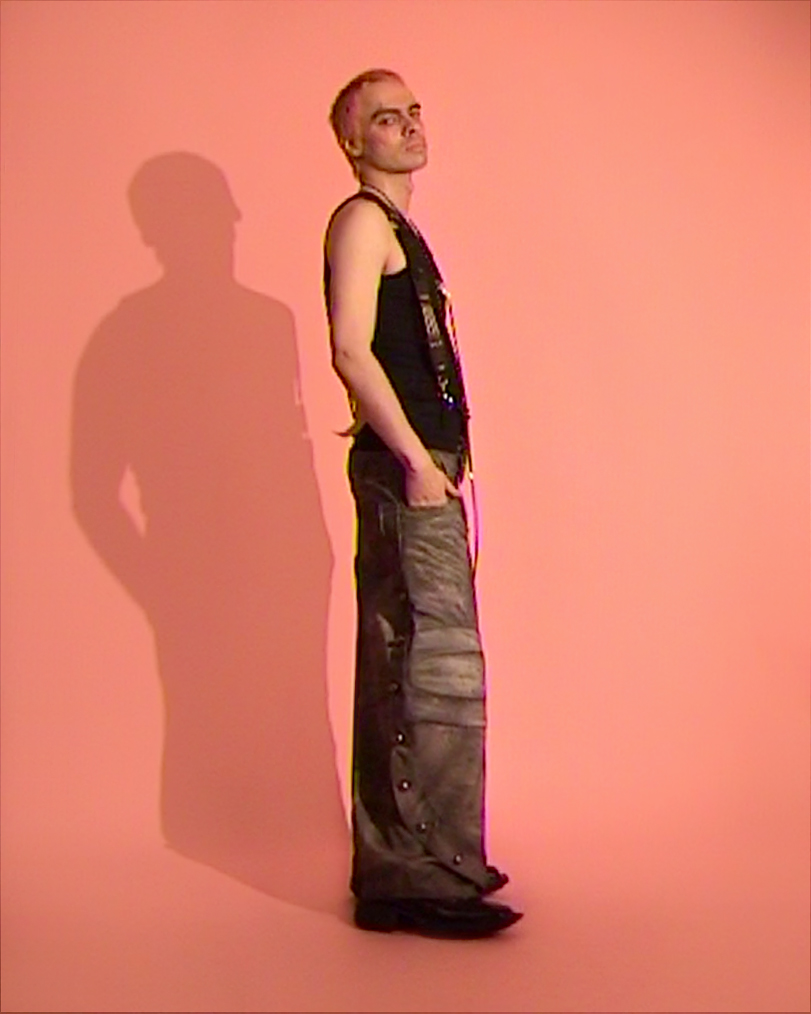
Top STYLIST’S OWN, trousers 8IGB, shoes UNTITLAB, suspenders AKI ANTTI KRISTIAN NUMMELA
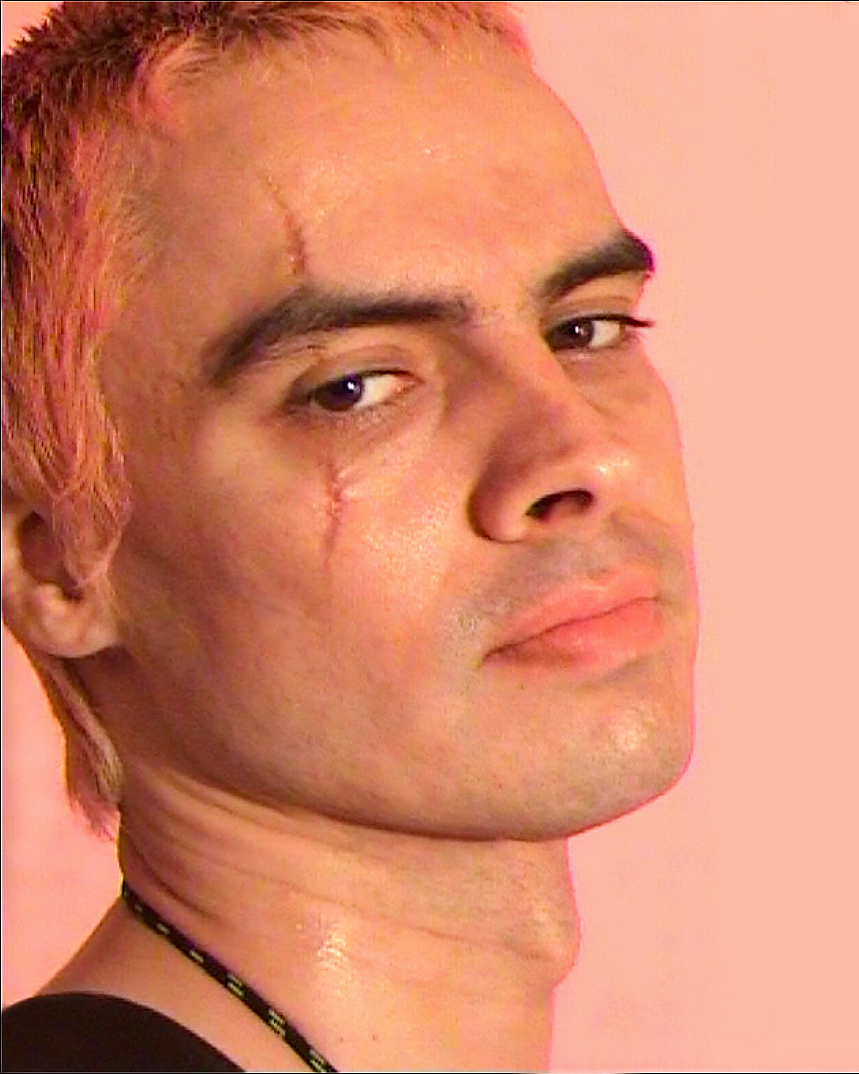
The challenge of dissecting this dream-logic makes Dennis even more fun to engage with. “It’s an album that is based around a day in a life of somebody who isn’t sure if they woke up,” Bodega explains the underpinnings of his latest project. Born out of a turbulent period in Bodega’s personal life that led him to an intense ‘state of mania’, the album is an auditory translation of that sleeplessness, lucidity and un-reality. “I wanted my audience to feel those disorientation elements that I felt when making it. I really hope that dream-state connects,” he continues. Already on the first listen, it certainly does. Starting from the blaring alarm of the opening track, Adulter8, the listener is catapulted into a space beyond the laws of nature. Time loosens its grip and basic touchstones of reality fade into something that eludes our grasp. The pulsating grandiose of his production dictates a specific state: hyper-sensitivity to the inner; numbness to the outer.
On the second listen, patterns being to emerge—the whole record oozes a sense of strange familiarity. “I wanted to create something that feels like you’ve been there before,” reflects Bodega. Sonically, this déjà-vu is dexterously crafted from his signature patchwork of genres, laid upon the audience like a thin veil of nostalgia for the unknown. Taking sounds from something so recognisable, so comforting—elements from UK bass, R&B, trap, rock—and morphing them into a new whole that reaches beyond any expectation is a Sega Bodega specialty. On Dennis, this notion is amplified even further. Gently hissing Mediterranean guitar and soft piano co-exist with saturated synths and punching breaks, all connected by choral, nebulous vocals. Though inherently future-forward, Bodega’s productions also hold a faint medieval, folkloric flavour.
Conceptually, too, Dennis roots from the primordial. Deer Teeth, for example, was inspired by a 7,000-year-old Mesolithic burial of a woman and her baby; they were found with “200 deer teeth as the baby was cradled in the wing of a swan”. For Set Me Free I’m an Animal, Bodega looks towards “the idea of Vikings sailing on a boat” and “the deep, deep chanting vocals…”. When asked about the process of collecting all these references, Bodega remains laconic: “It gets confusing to explain.” However, a clear influence is that of cinema: “I loved Suspiria and Benedetta,” he speaks with excitement. “In Suspiria, they talk a lot about tears, sighs and darkness, so I named a song ‘Tears and Sighs’.” Translating a visual experience into an acoustic one is also something that comes to Bodega naturally. “I ended up being so inspired by the way it was edited—and I started applying the same kind of editing to my music,” he explains, referring to the “sharp cuts and dream-like panting.” Within this sea of storylines and inspirations, putting together the puzzle pieces of the project may not be a straightforward task. “Every song has a different reference point, so they’re not necessarily all connected,” he acknowledges. Still, there are thoughtful details that ensure the listener remains in the zone. For example, he talks about the constant symbol of a “siren-ey woman voice pulling you in”, hypnotic mantras of his friends Cecile Believe and Mayah Alkhateri, luring us into the shared unconsciousness. “When it comes to the lyrics and the imagery, the theme has to come out,” the artist states firmly.
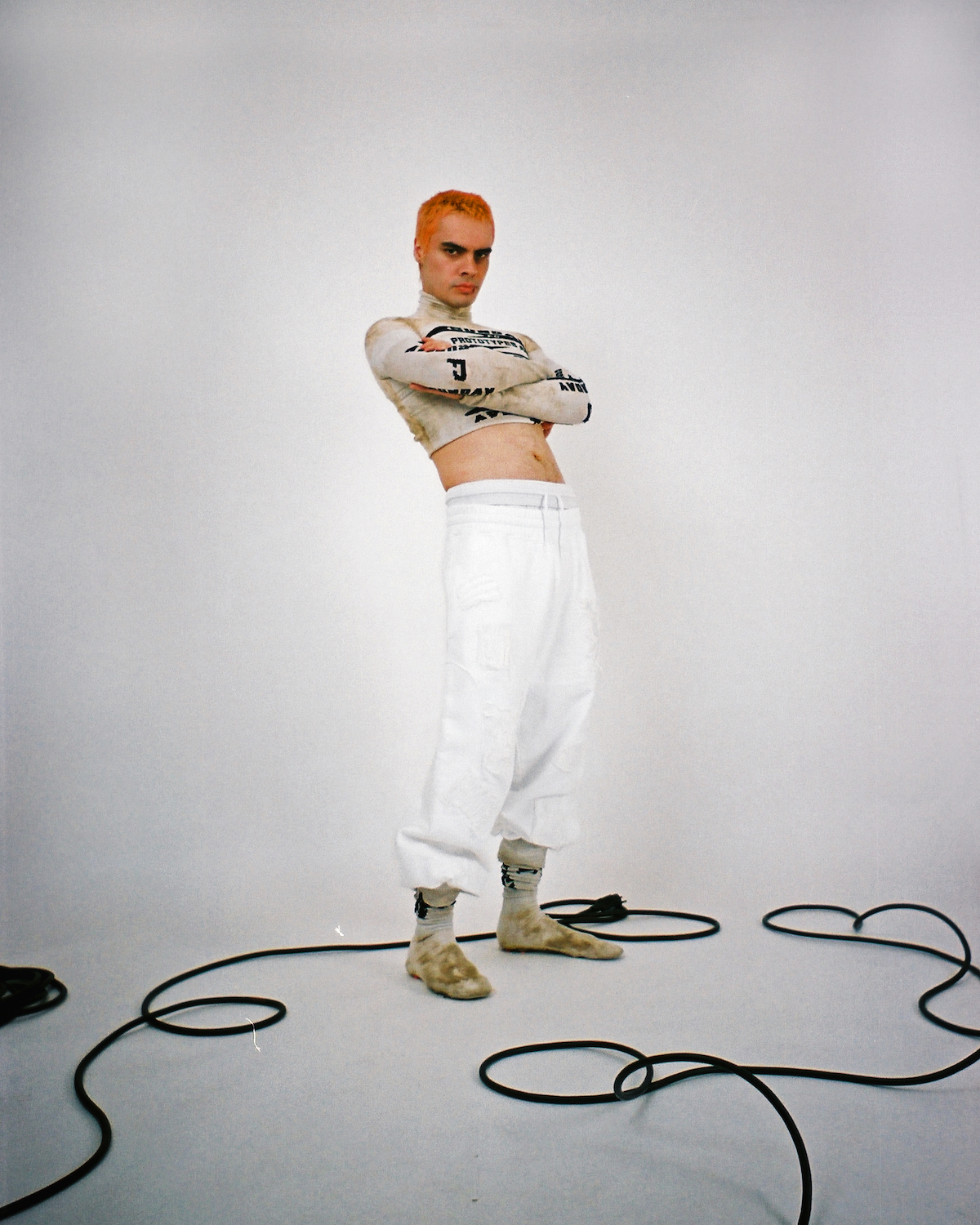
Top and shoes PROTOTYPES, trousers ÉTUDES, shorts STYLIST’S OWN
For Bodega, this idea of world-building within a project feels central and all-consuming, as he tends to write for a perspective of different parts of himself to “sequence and tell the story coherently”. Much like his previous works—Salvador, a self-reflective exploration of Bodega’s dark side, and Romeo, a love album around his inner romantic—Dennis is yet another manifestation of Bodega’s shadow self. “You know when you’re in a dream and people are the people you think they are, but they look different?” Bodega asks with a child-like sincerity, as if it was the most normal question to ask about the most universal experience. After a momentary confusion, I admit that I can actually relate. “It’s like who I am in this situation, and Dennis was just another name I liked.” Digging deeper, Dennis also fits in with the gravitational pull Bodega has towards religious imagery that informs his work and characters within it—think Luci, short for Lucifer, a fictitious lover made entirely out of light who has inspired Romeo. “For some reason, I always end up talking so much about heaven and sin and all these biblical things,” Bodega contemplates, “and something just clicked when I figured out that Dennis backwards was Sinned.”
Reflecting on these biblical motives is a broader exercise in connecting with Bodega’s discography. From titles such as Only See God When I Come to Raising Hell off his previous albums, the presence of something divine overlooking both Bodega and the listener hangs in the air. “It’s just timeless,” the artist explains of his fascination with biblical narratives. “It’s like life guides to help you deal with fear and identity and who you want to be. And even if I don’t take that from the Bible nor agree with its morality, I still appreciate it,” he elaborates. “It can be dark, and it covers true happiness as well as fear… there’s just so much drama.” This hyperbolism is also something deeply present in Bodega’s sound: his tracks have seen everything from the devilish depths of grief to ecstatic revelations. Choir-like, celestial vocals and elevated pitches on songs such as Heaven Fell (Reprise) drift and transcend, taking the listener with them; tracks like Heaven Knows pull the audience into the ominous. Grappling with psychological questions of human condition, conflicting behaviour, addictions and escapes, death and falling in love, Bodega’s catalogue feels, in some way, like a parallel ‘life guide’ to deeply experiencing the world as modern youth.
It’s also impossible to speak of Bodega’s work without acknowledging the centrality of collaboration and vision-sharing he’s surrounded himself with. The foundation of the iconic label and collective NUXXE by the holy trinity of Coucou Chloe, Shygirl and himself was a pivotal moment for the electronic pop landscape. Even though, as he tells me, NUXXE has now come to an organic end, the community built and talented uplifted through it remain monumental. “It’s a movement in music and art that makes people feel like they’re a part of that collective, too—it gives a sense of belonging,” Bodega muses on the impact of artists coming together. However, despite having worked with incredible talent and Glamcult darlings Sevdaliza, Eartheater and Oklou, the mastery of artistic exchange didn’t come to Bodega straight away. “I had to learn how to be more honest with people, and therefore be more like myself. Entertaining niceties can make you follow a direction you don’t fully believe in,” he divulges.
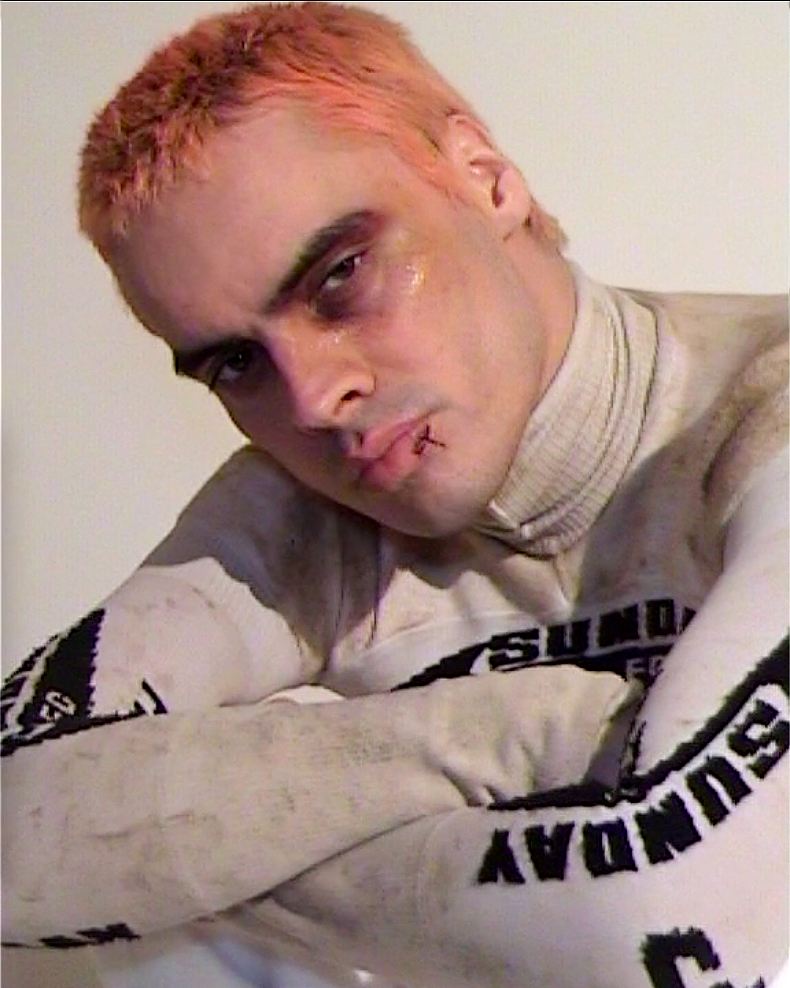
Top PROTOTYPES
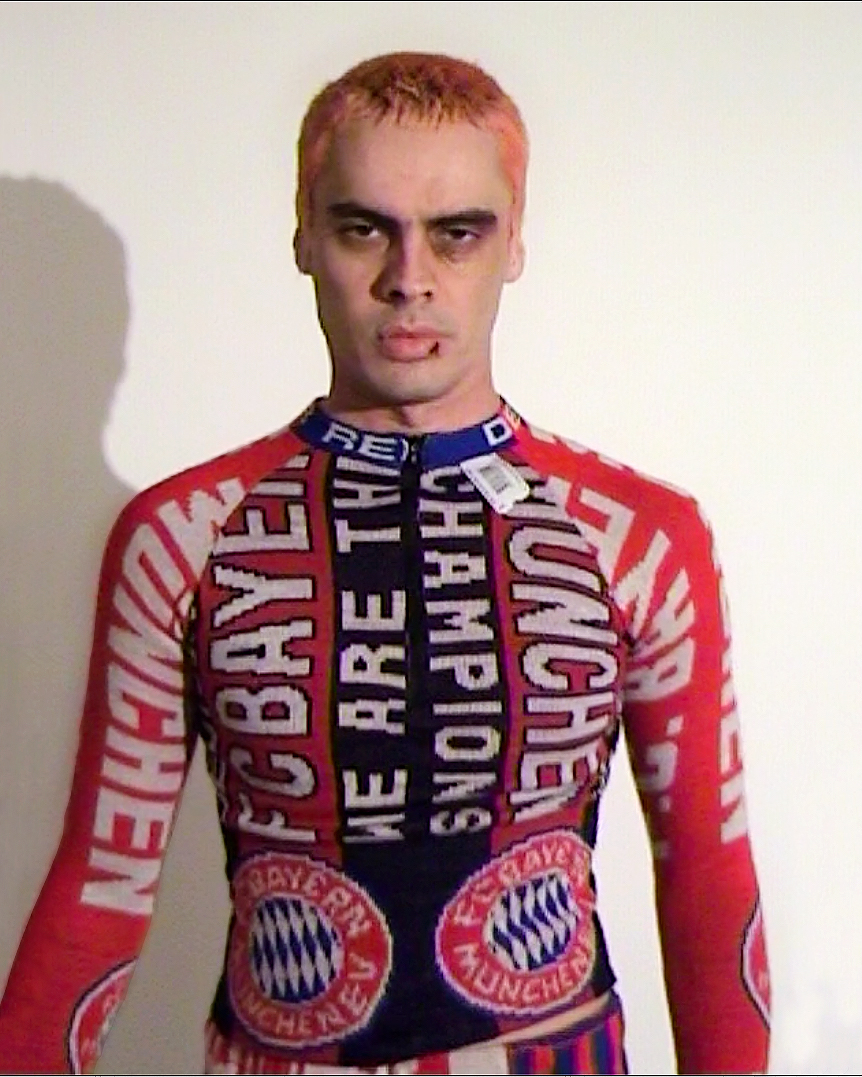
Top PROTOTYPES
Now that his musical intentions are solid, Bodega extends the collaborative reach to his audience as well. A large portion of Dennis came to life on Twitch, as Bodega streamed his intimate flow of tinkering with Logic until a full track was born in front of his fans’ eyes (and ears). “I’ve never made music for an audience in this way,” Bodega admits. “It was an interesting process of being so concentrated on the music and engaging with people at the same time. I took on some people’s ideas or made songs from the stems they’d send in,” he recalls of connecting with his listeners, as voices of his admirers from Greece excitedly open on Elk Skin with a proclamation of their love. This bond is something Bodega wants to strengthen even more. “I’m excited to play live and figure out what makes me comfortable,” he says in anticipation of his tour this summer. “I always tend to hide behind something during my live shows,” Bodega shares—and it makes perfect sense with his warmly timid disposition. “I will try to avoid doing that now, to be more present with my audience.”
On the subject of future goals, Bodega declares his faithfulness to music for the foreseeable. “There is nothing else I’m good at,” he shares endearingly. “It’s the only thing I can properly focus on—otherwise my ADHD brain kicks in.” And having now moved to Paris in late 2020, he’s in the perfect place to concentrate on his craft. “I love being here, and I just really didn’t want to be there,” Bodega talks of leaving London, whose electronic scene was embellished with his name for many years. “I left London because I was paying too much fucking money for places I couldn’t call home whatsoever,” he hints at the cost-of-living crisis and laughable politics that are eating away at the city’s creative landscape. Fortunately, Paris has welcomed him with open arms. “I grew up listening to French electronic music and it’s really fun to be working with some of those people here now,” he says, adding that he can’t share the names to not “feel like an idiot if it doesn’t come out”.
The grand aspiration, though, is entering the realm of cinema. “I really want to make music for films,” Bodega states confidently. “This is where I want to be in five years.” From soundtracking the Lunar New Year campaign for Bottega Veneta to contributing to Brooke Candy’s iconic PornHub film I Love You, he’s already off to a pretty good start. Reminiscing one of his earliest projects, SS (2015), where he created alternative soundtracks for cult classics like Eraserhead, A Clockwork Orange and Fallen Angels, it’s evident that the vision of an ardent cinephile has always been grand. “It’s hard to explain,” Bodega returns to the phrase of the interview, “but there is definitely a visual world I want to be in.” And whatever world this may be, if Sega Bodega is leading us there, we shall follow.
At the end of our conversation, we ask him about the sense of resolution on Dennis. With the whole album floating in the space of not knowing if you’re dreaming or not, the softly ethereal, lullaby-like finisher Coma Salv gently dissolves the listener into long-awaited rest. Concluding such a wild ride, you finally fall off the edge of your consciousness and ‘go to sleep as yourself’. The question of Dennis is, whether it’s dancing amongst heated bodies or sinking into the solitude of your bedroom, who’s to say that experiences of altered states are any less significant than those rooted in the observable world? The answer: it’s completely up to us to decide where mind stops and reality begins.
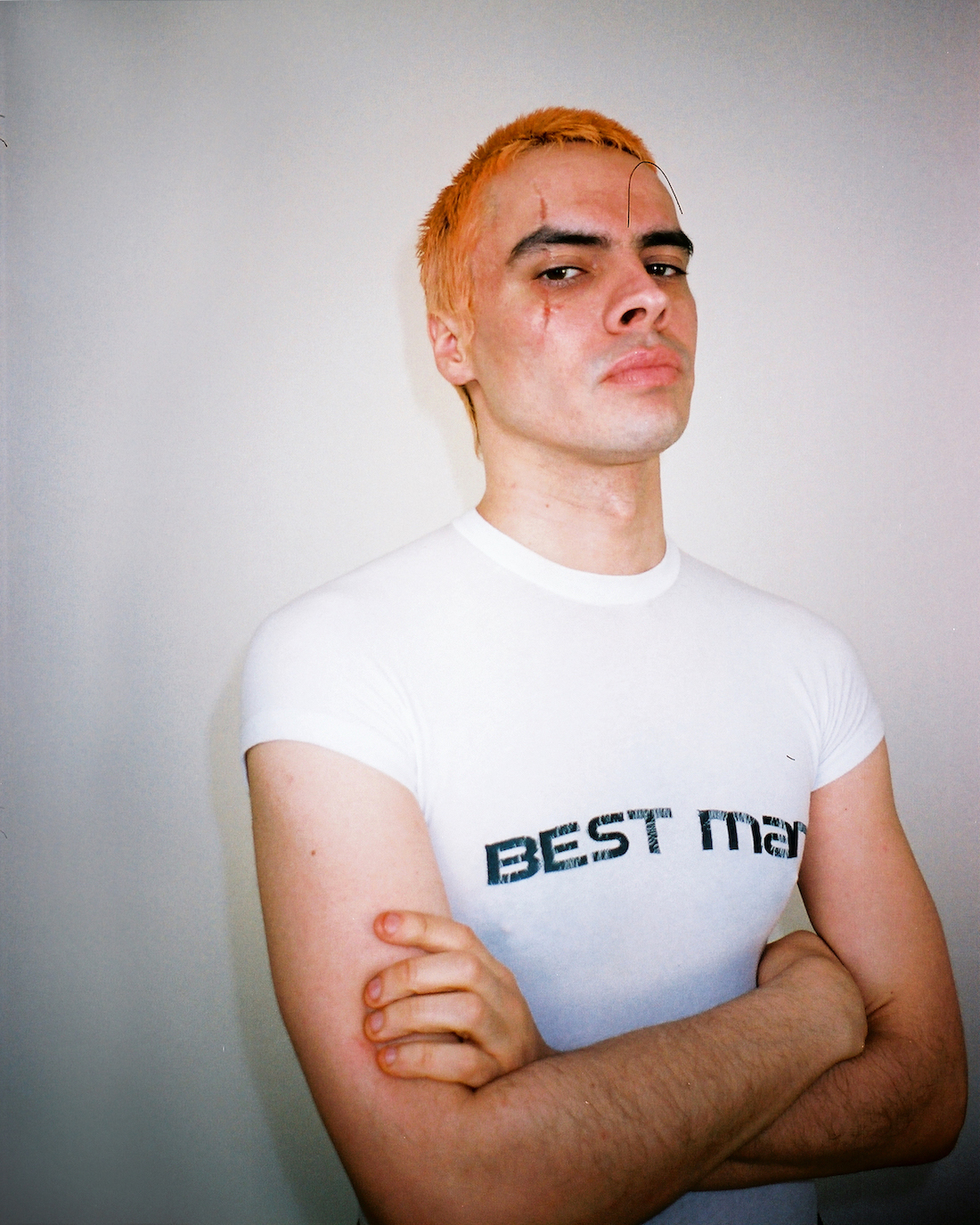
Top PROTOTYPES
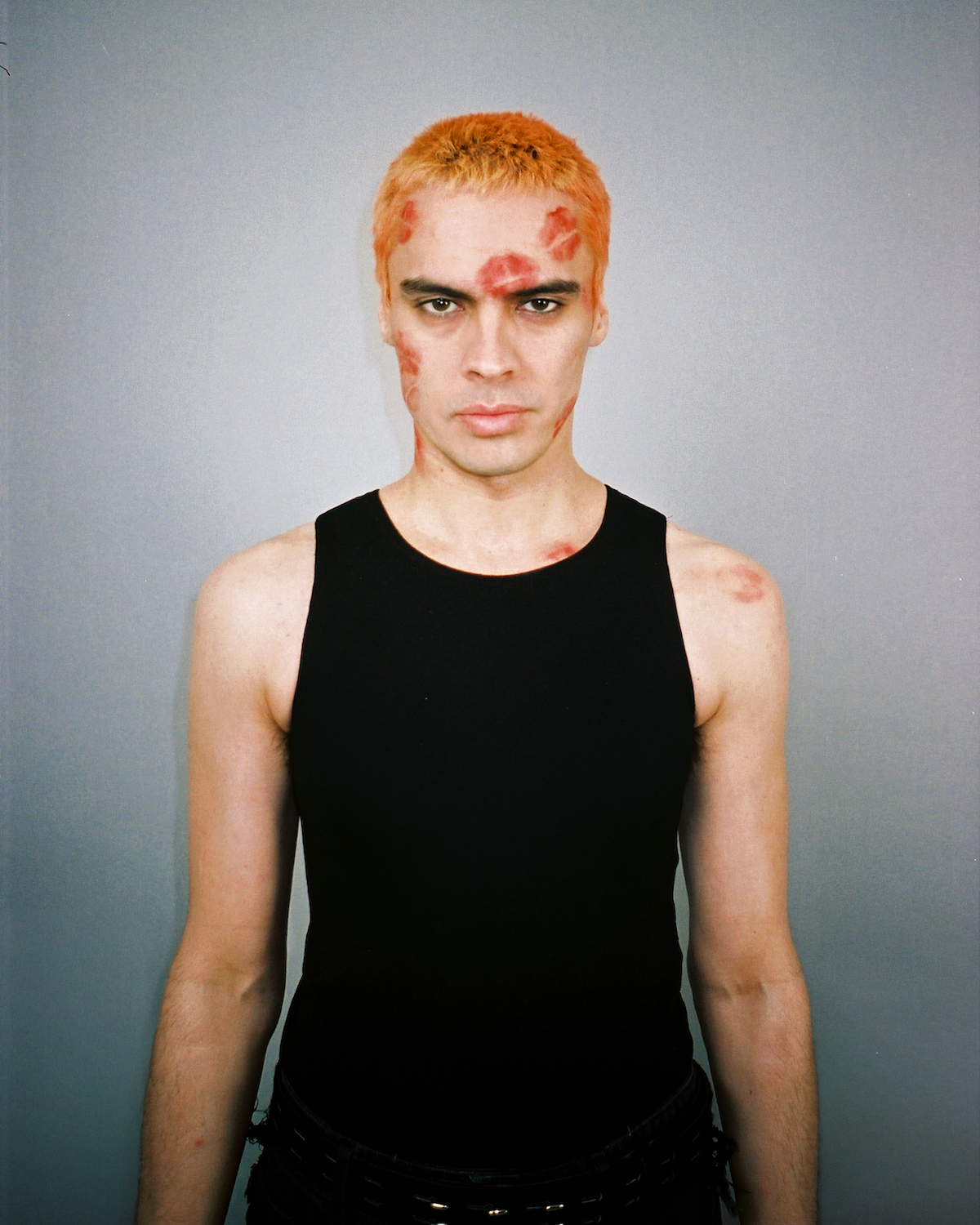
Full-look CANNNONE
Words by Evita Shrestha
Photography by Tom Goddard
Styling by Regina Ntahompagaze
Hair,make-up, and special effects by Catalina Sartor
Styling assistance by Annabelle Hernandez and Shelsa Ondo